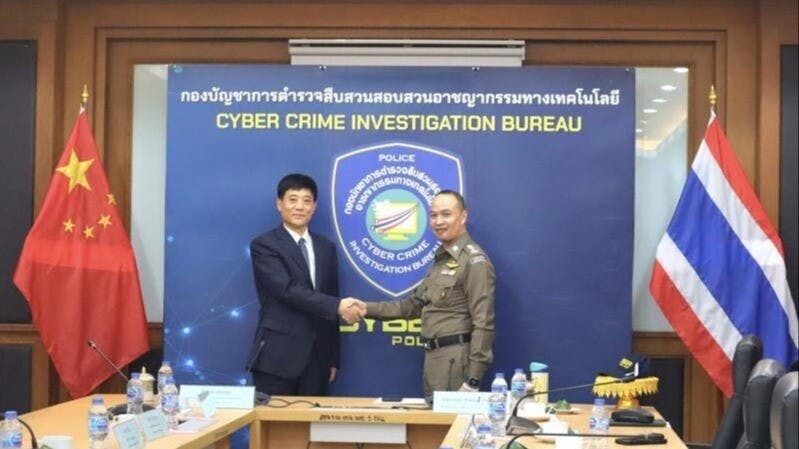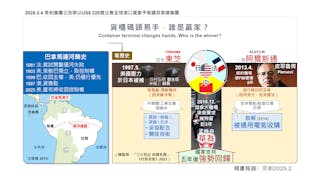2025年1月27日,中國公安部副部長劉忠義率團訪問泰國,在暖武里府會見泰國網絡犯罪調查局警察局長基特拉·潘帕。劉指妙瓦底省目前有36個由華人經營的大型詐騙集團,僱用及控制高達10萬人從事網絡詐騙犯罪活動,騙取受害人錢財,直接引致非法販賣中國內地受害人。
劉補充道,許多中國公民被引誘、詐騙和綁架到緬甸工作。有的被毆打,甚至死亡。他向中泰兩國警方提出了幾項應對措施:
(一)中方將向泰國警方提供詐騙集團資金流向的詳細信息,特別是涉及人口走私的資金轉移;
(二)中方要求泰方協助抓捕潛伏在泰國境內的犯罪者;
(三)中方將協助泰方逮捕涉嫌綁架大陸演員王星的20名犯罪嫌疑人;
(四)這20名犯罪嫌疑人被捕後將引渡回中國受審;
(五)中方對泰方為追捕犯罪嫌疑人提供的一切協助表示感謝。
此外,中國警方要求泰國警方採取措施營救被扣押在緬甸境內的中國公民,並要求泰方停止向這些詐騙集團供電和管控販賣人口的路線,務必縮小跨境詐騙集團的活動空間。

成立協調中心 增強國際信心
中泰雙方警方將成立打擊跨國詐騙犯罪集團聯合協調中心,由雙方偵查人員參與,並加大聯合行動力度,希望此舉能安撫中國遊客對赴泰安全的擔憂,進而增強國際社會對泰國的信心。
劉的訪問意義重大,因為它標誌着中泰警方合作,聯手打擊活躍於緬甸妙瓦底地區的跨境詐騙集團。
此外,由於詐騙集團在轉移資金和洗錢的過程中使用了加密貨幣,警方雙方將共享犯罪情報和資金流向,並阻止贖金從受害國流出。最後,泰國警方建議中國警方主動與緬甸、寮國、柬埔寨等國召開地區警察會議,討論打擊跨境網絡犯罪和詐騙集團的長期措施和解決方案。
針對泰國警方的建議,劉給予高度評價,相信透過中泰警方的共同合作,將建立起打擊跨境詐騙集團的高效模式,將在地區和世界範圍內樹立反詐騙的榜樣。
除了中國、泰國、緬甸、柬埔寨、寮國、新加坡、韓國、日本、馬來西亞、菲律賓、印尼等國正在進行警察合作外,國際刑警組織和東協等區域組織可能還需要分別做更多的協調和規劃工作。
不要輕信高薪工作利誘
王星案落網的主要犯罪嫌疑人來自江蘇,利用不同名義欺騙受害者。據香港傳媒報道嫌犯「顏十六」本名顏文磊,過去十年曾在橫店多個劇組擔任群演、動作指導、導演等職位,他自稱是泰國一家電影公司的協調員,邀請至少了十名大陸人到泰國工作。針對王星案等受害者案件,內地警方呼籲中國公民提高警惕,不要相信他人以所謂高薪工作引誘到境外工作的惡意行為。
王星案令泰國警方震驚,泰國作為旅遊中心的形象受到損害。泰國警方迅速採取行動,嚴厲打擊涉嫌跨境犯罪者。1月20日至24日,10名被認為具有高風險的遊客被拒絕進入泰國。47人被禁止留在達府;達府逾期居留的92人被逮捕並被罰款,其中包括一名中國人和一名印尼人。
此外,還有20名緬甸非法移民被捕。此次清理行動有利於打擊跨境人口偷渡和綁架。泰國警方也加強了緬甸附近地區營地和旅館住宿人員的邊境管制和檢查,其中包括來自中國、韓國、寮國、越南和衣索比亞的遊客。
2020年至2024年間,印尼政府遣返了約4700名在緬甸、柬埔寨、寮國和越南活動的詐騙集團受害的印尼公民。到2024年12月,至少90名印尼人仍被困在緬甸妙瓦底地區。顯然,亞洲還有許多人成為跨國網絡犯罪和詐騙集團的受害者。
跨國警務合作外 更多工作要做
綜上所述,中國、泰國、緬甸、柬埔寨、寮國、新加坡、韓國、日本、馬來西亞、菲律賓、印尼等國的跨國警務合作,打擊跨國詐騙集團勢在必行。除了這些跨國警務的合作外,國際刑警組織和東協等區域組織可能還需要分別推動更多的協調和規劃工作。
隨着社交媒體、加密貨幣和人工智慧的快速發展,亞洲跨境犯罪分子變得較前活躍,尤其是在後新冠時代,許多亞洲人被虛假的有償工作所誘惑。因此,除了跨國警方透過情報共享和聯合行動打擊跨境詐騙集團、打擊各國官僚腐敗、加強邊境海關控制、以及教育公民以提升其安全意識之外,每個人對跨境網絡犯罪保持警惕,都是亞太地區集體、更有效打擊跨國犯罪的必要措施。
Sino-Thai Police cooperation in the combat against scam syndicates: Implications for Asia
On 27 January 2025, the deputy minister of the Chinese Public Security, Liu Zhongyi, led a delegation to Thailand, meeting the Thai police commissioner of the cybercrime investigation bureau, Trairong Phiwpan, in the Nonthaburi province. Liu’s visit was significant as it signalled Sino-Thai police cooperation in the joint combat against the scam syndicates operating in Myanmar’s Myawaddy area that borders Thailand’s Tak province (Bangkok Post, 28 January 2025).
According to Liu, there are currently 36 large-scale scam syndicates operated by ethnic Chinese in Myawaddy, and they are employing and controlling 100,000 people to engage in cybercrime deception, cheating money from victims and directly triggering the illegal trafficking of victims from mainland China (Oriental Daily, 30 January 2025, p. A17).
Liu added that many Chinese citizens were lured, cheated and kidnapped to work in Myanmar; some were beaten up, and some even died. He proposed several measures for the police of China and Thailand to tackle the situation: (1) China would provide the Thai police with the details of capital flows of the scam syndicates, especially those money transfers that involved human smuggling; (2) China requests Thailand to help arrest those ringleaders who are hiding inside Thai territory; (3) China would help Thailand to arrest the 20 suspected criminals who were involved in the kidnap of mainland actor Wang Xing; (4) these 20 suspects would be extradited to China for trial once they are arrested; and (5) China expresses its gratitude to Thailand for all the assistance in pursuing the criminal suspects.
Furthermore, the Chinese police requested that the Thai counterpart utilise its intelligence and technology to confirm the identities of those Chinese people who have been detained within Myanmar territory, that it adopt measures to rescue them, that Thailand terminate the supply of electricity to those scam syndicates (an action appreciated by the Chinese side), and that it strengthen the control over the routes involved in human smuggling. In short, the space for the activities of cross-border scam syndicates would have to be narrowed. The police from the Chinese and Thai sides are going to establish a joint coordination centre in the combat against the cross-border scam syndicates, involving investigators from both sides, and the increase in the intensity of their joint operations. Under these circumstances, it is hoped that the Chinese tourists’ anxiety about their safety in visiting Thailand would be appeased, thereby enhancing the confidence of the international society in Thailand.
The Thai police’s cybercrime investigation bureau proposed several cooperative measures. These include a joint working group composed of the Thai centre for controlling cybercrime and the Chinese public security. Both sides will share criminal intelligence. The Thai police will also request the Chinese side’s assistance in cracking down on the ethnic Chinese ringleaders and the Thai collaborators. Furthermore, because the scam syndicates have utilized cryptocurrencies in the processes of transferring capital and laundering ransom money, both sides of the police will share criminal intelligence and capital flows and stop the outflow of ransom money from the victims’ country. Finally, the Thai police suggested that the Chinese police take the initiative to convene a regional police meeting with Myanmar, Laos, Cambodia and Thailand to discuss the long-term measures and solutions for combating cross-border cybercrime and scam syndicates.
In response to the suggestions from the Thai police, Liu Zhongyi praised the proposed measures highly, and he believed that, through the joint cooperation between the Chinese and Thai police, a highly efficient model for combating cross-border scam syndicates will be established and an example of anti-deception in the region and the world will be made.
Just one day before Liu’s visit to Thailand, the Thai police took swift action to crack down on some corrupt elements in the Thai police force and to rescue seven Chinese who were kidnapped. On 27 January, the Thai police announced that four corrupt police officers, one soldier and three ordinary citizens (one was Burmese) were arrested for being involved in the kidnap of Chinese victims. The seven Chinese, who were rescued by the Thai police, had their relatives intimidated for a ransom of HK$460,000 to get each victim released. These seven Chinese victims were aged 22 to 25, and they were lured with lucrative jobs, crossing the Laos border illegally into Thailand’s northeastern territory. The kidnappers asked the victims to call their relatives in Laos for ransoms. According to the Thai police, any corrupt elements within the local police force will encounter administrative, disciplinary and criminal penalties.
It is imperative for cross-border police cooperation in the combat against transnational scam syndicates, involving China, Thailand, Myanmar, Cambodia, Laos, Singapore, South Korea, Japan, Malaysia, the Philippines, and Indonesia. Regional organisations, such as INTERPOL and ASEAN, will perhaps have to do more coordination and planning work respectively, apart from the ongoing intergovernmental police cooperation among these countries.
On 17 January, it was reported that the Thai military dispatched a special duty group to set up inspection sites along the main routes in the border between Thailand and Myanmar. Warning signs that use Thai, English and Chinese languages were used to alert tourists to the danger of scam syndicates along the border area. The Thai military set up inspection points to check the vehicles going through the border to Myanmar, consolidating and intensifying identity checks of foreign tourists and terminating those people without justification to cross the border.
Due to the close cooperation between the Thai and Chinese police, a main suspect involved in the plan of kidnapping Wang Xing had been arrested and was sent back to mainland China on the night of 25 January. The suspect used high pay to lure Wang Xing to participate in a “film” in Thailand. Two mainland Chinese, who belonged to the same batch of victims involved in the Wang Xing case, are still missing (Ming Pao, 28 January 2025, p. A11).
The main suspect who was arrested in the Wang Xing case came from Jiangsu province, utilising different names to cheat the victims. According to Hong Kong reports, the suspect worked in the mainland film industry before and claimed to be a coordinator of a film company in Thailand. He invited at least ten mainlanders to work in Thailand (Oriental Daily, 28 January 2025, p. A13). In response to the Wang Xing case and other cases of victims, the mainland Chinese police appealed to Chinese citizens about the necessity of increasing their vigilance to scam syndicates and distrusting any malicious attempts at luring them to work outside China with so-called highly paid jobs.
The Wang Xing case alarmed the Thai police as the image of Thailand as a tourist hub was undermined. The Thai police took swift action to crack down on the suspected cross-border criminals. From 20 to 24 January, ten visitors who were regarded as having high risks were denied entry into Thailand. Forty-seven people were disallowed to stay in Tak province; and 92 people who overstayed in Tak province were arrested and fined, including one Chinese and one Indonesian. Furthermore, 20 Burmese who were illegal migrants were arrested. This clean-up measure was conducive to the combat against cross-border human smuggling and kidnap. The Thai police also enhanced border control and inspection of those people who stayed in camps and hostels in the areas near Myanmar, including tourists from China, South Korea, Laos, Vietnam and Ethiopia (Oriental Daily, 28 January 2025, p. A13).
The telecom fraud syndicates in Southeast Asia victimize not only the Chinese from mainland China and Hong Kong, but also Singaporeans, Japanese, South Koreans, Malaysians, Filipinos and Indonesians. In June 2024, four Singaporeans were rescued from a scam syndicate that operated in Manila (The Strait Times, 15 November 2024). In January 2025, six Japanese nationals were held captive in eastern Myanmar, according to a Thai NGO named the Civil Society Network for Victim Assistance in Human Trafficking (The Asahi Shimbun, 15 January 2025). In November 2024, the South Korean police arrested members of a scam syndicate which operated in Cambodia and Laos, and which stole US$66 million from 66 Koreans through investment scams (Radio Free Asia, 20 November 2024). In March 2024, some young Malaysians, mostly from Sarawak, were stranded in Myanmar and Cambodia after falling into the traps of overseas job scams. In November 2024, eight Filipinos were rescued from a scam syndicate running cryptocurrency scams in Myanmar (The Strait Times, 22 November 2024).
Between 2020 and 2024, the Indonesian government repatriated some 4,700 Indonesian citizens who were victimized by scam syndicates that operated in Myanmar, Cambodia, Laos and Vietnam. By December 2024, at least 90 Indonesians were still trapped in Myanmar’s Myawaddy area (The Strait Times, 21 December 2024). Clearly, many other people in Asia have become the victims of cross-border cybercrime and scam syndicates.
In conclusion, it is imperative for cross-border police cooperation in the combat against transnational scam syndicates, involving China, Thailand, Myanmar, Cambodia, Laos, Singapore, South Korea, Japan, Malaysia, the Philippines, and Indonesia. Regional organisations, such as INTERPOL and ASEAN, will perhaps have to do more coordination and planning work respectively, apart from the ongoing intergovernmental police cooperation among these countries. With the rapid development of social media, cryptocurrency and artificial intelligence, cross-border criminal elements have become far more active than ever before in Asia, especially in the post-Covid era when many people in Asia have been lured by the fake claims of highly paid jobs in overseas countries. As such, apart from intergovernmental police cooperation in the combat against cross-border scam syndicates through intelligence sharing and joint operations, domestic combat against bureaucratic corruption, tighter control over customs along the borders, internal education of citizens to heighten their sensitivity towards personal safety, and individual vigilance against cross-border cybercriminals are all necessary measures for a collective and a more effective crusade against transnational crimes in the Asia-Pacific region.
原刊於澳門新聞通訊社(MNA)網站,本社獲作者授權轉載。(原文按此)






































